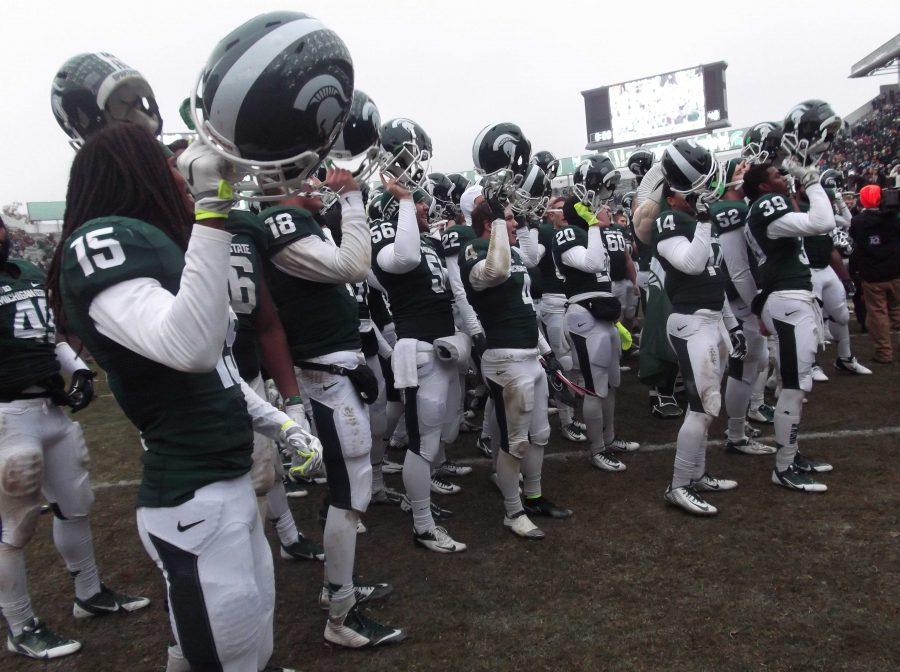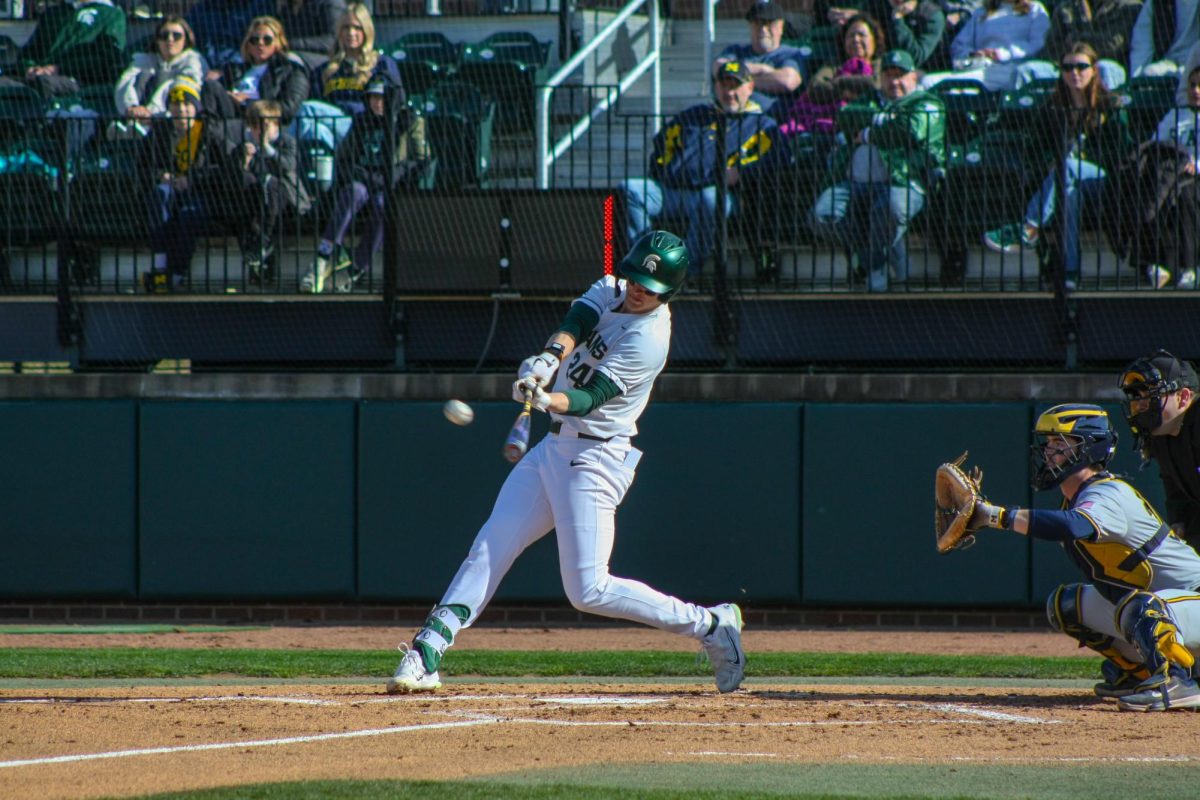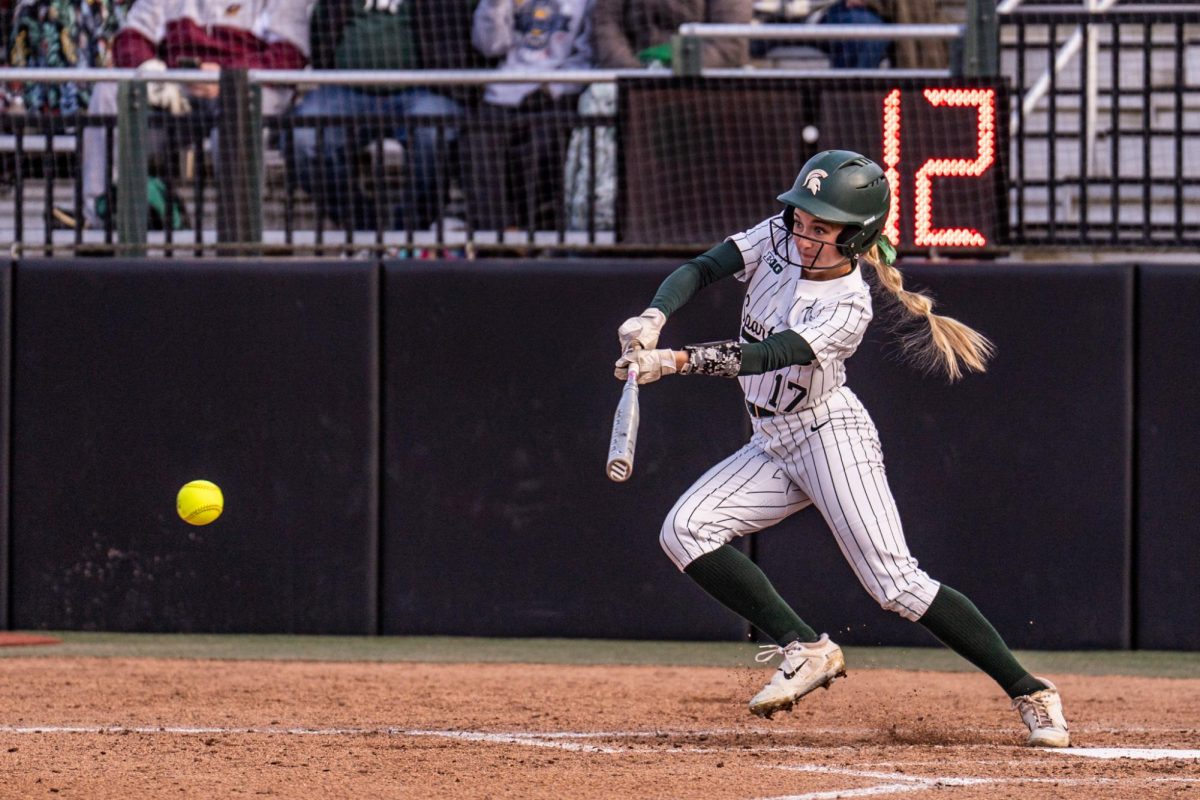Whether the team is the loser of the AutoZone Liberty Bowl or the defending national champions, all teams are far from perfect. Besides recruiting, the off-season is a great opportunity for coaches to evaluate the team’s overall performance last year and seek flaws that they need improvement on.
By learning, and more importantly, correcting these errors will result in more efficient teams in the upcoming season. From mental mistakes to execution mishaps, there are a variety of mistakes that can be made by players and even coaches.
Despite the recent success that the Michigan State football program has been experiencing, they escaped with several repetitive mistakes last year that could have resulted in a completely different season.
Here are last year’s three biggest lessons that the Spartans can and need to master for the 2015 season in order to make a national championship run:
ALWAYS keep your foot on the gas pedal
Michigan State Football has never been accustomed to experiencing glory and receiving high expectations from the college football world.
With that being said, they didn’t particularly handle the spotlight very well. They were extremely complacent in three big games early in the season.
They had a complete mental breakdown in a September top ten clash at Oregon. A Michael Geiger field goal extended the Spartans lead to 27-18 early in the third quarter. Oregon would then make a furious rally by scoring the game’s final 28 points, scoring on plays of 24, 37 and 38 yards. This fired up the Ducks’ defense, as they kept MSU off the scoreboard for the rest of the game.
One month later, the Spartans had back-to-back near collapses against their first two in-conference foes, Nebraska and Purdue. For both games, MSU had a three-possession advantage and could have easily put the game out of reach. Instead, Nebraska and Purdue made the contest a lot more interesting than it needed to be. Both opponents made big plays throughout the entire second half to cut the deficit to a one-possession game. It took a game-winning interception near the end of each game to seal the deal that could have and probably should have been losses for the Spartans.
If MSU can play complete games and stay 100 percent focused on every snap, they will be in good shape moving forward.
Do NOT be afraid to run the ball
Just because you are losing by multiple possessions (even with plenty of time left), does not mean the coach’s play calling has to be pass heavy. I feel like this was Mark Dantonio’s game plan when MSU was trailing against Oregon and Ohio State and there were even some early, subtle signs in the Michigan game.
When the defense was struggling to keep Oregon and OSU out of the end zone, the next offensive possession featured pass happy quarterback Connor Cook. Cook threw the ball 47 times versus Oregon and 45 times versus OSU. Yes, MSU had arguably the best quarterback and receiving core in the Big Ten and possibly in the country, but they also had an underrated offensive line and running back. Last year’s offensive line was the best offensive line in the Dantonio era, as they gave up fewer sacks than any MSU O-line.
Then there’s Jeremy Langford, a workhorse of a running back who got stronger as the game goes on. He had a dangerous combination of power and speed, while back up Nick Hill had that break away speed to take it to the house every time he touched the ball. Langford wore down the Buckeyes’ defense with 18 carries for 137 yards (7.6 yard average).
For the most part, the O-line outplayed and outworked both the Ducks’ and Buckeyes’ defensive line. MSU experienced huge gains on the ground as gaping holes opened up on inside runs because of the strong passing game. If the Spartans let Langford carry the load while trailing, MSU’s chances of a comeback would’ve increased significantly. A team like Michigan State can never be one-dimensional due to the fact that all positions are considered to be strengths, and it’s too predictable for opposing defenses.
MSU is once again expected to return a veteran offensive line with a fresh new face at running back (freshman Madre London, sophomore Gerald Holmes, freshman L.J. Scott). With this in mind, let’s hope Dantonio isn’t reluctant to keep the ball on the ground regardless of the score. The main idea is to stick to a formula that consistently works.
Take more shots downfield
I don’t think there was a more accurate deep passer last year in the entire country than Cook. He was on the money almost every time he threw a pass 30+ yards. He had great timing to his throws and terrific arm strength. The passing game featured tall and nimble receivers like Tony Lippett, Keith Mumphery, Jamal Lyles among many others who made it a dream come true for Cook.
Almost every defensive back that was paired with one of the top receivers (especially Lippett) turned out to be a huge mismatch that favored the offensive unit every time.
Now don’t get me wrong, I think Coach Dantonio has an efficient, balanced philosophy on the offensive end. However, I felt that Cook could’ve taken at least one shot on each offensive possession. He had the tools and personnel to do that, regarding the enormous depth and talent on the offense.
Since the majority of Cook’s bombs were completed, it opened up several play calling possibilities. For example, it opened big running lanes for Langford and Hill, and slants and screen plays were completed with ease.
Michigan State loses a plethora of key pieces at the running back and wide receiver positions, with 1000+ yard leading running back Langford and 1000+ receiving yard leading receiver Lippett heading off to the NFL. However, there are several worthy candidates to fill those big shoes for the upcoming season, such as London and Holmes at running back and DeAnthony Arnett and Aaron Burbridge anchoring the receivers.
Cook is too talented to not take shots early and often, not to mention MSU has an experienced receiving corps with a ton of promise and potential, as shown in the Spring Game.
Photo: Bradley Allen












